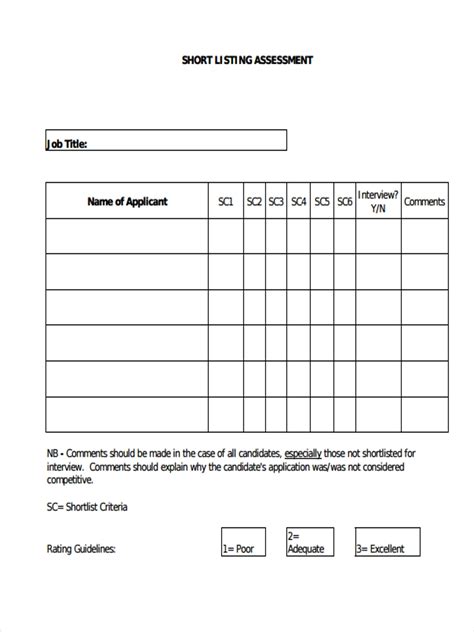Shortlisted for a Job? FAQs and English Explanation

Getting shortlisted for a job is an exciting step in the hiring process. It means that your application and qualifications have caught the attention of the employer, and you are being considered as a potential candidate for the position. However, it’s important to understand what being shortlisted entails and what you can expect moving forward. In this article, we will answer some frequently asked questions about being shortlisted for a job and provide insights into what it means for your job search.
1. What does it mean to be shortlisted for a job?
Being shortlisted for a job means that your application has progressed to the next stage of the hiring process. It indicates that the employer has reviewed your qualifications and believes you have the potential to be a good fit for the position. Shortlisting typically happens after the initial screening of resumes and can involve further assessments, such as interviews or skills tests.
2. How are candidates shortlisted?
Candidates are shortlisted based on their qualifications, skills, and experience outlined in their application materials, such as resumes and cover letters. Employers typically look for candidates who meet the requirements listed in the job description and demonstrate the potential to excel in the role. They may also consider factors like relevant work experience, education, certifications, and achievements.
3. What happens after being shortlisted?
After being shortlisted, you may be invited for further assessments or interviews to evaluate your suitability for the job. This could involve phone interviews, video interviews, in-person interviews, or assessment tests. The purpose of these assessments is to gather more information about your skills, qualifications, and fit for the company culture. It’s important to prepare for these assessments and showcase your strengths and abilities.
4. How long does the shortlisting process take?
The duration of the shortlisting process can vary depending on the number of applicants and the hiring timeline of the employer. It may take anywhere from a few days to a few weeks. If you haven’t heard back from the employer after a reasonable amount of time, it’s acceptable to follow up with a polite inquiry to inquire about the status of your application.
5. What should I do if I’m not shortlisted?
If you’re not shortlisted for a job, it’s important to stay positive and continue your job search. Take the opportunity to reflect on your application and identify areas for improvement. Consider seeking feedback from the employer if it’s provided to understand why you weren’t selected. Use this feedback to enhance your future applications and interview performance.
6. Can I be shortlisted for multiple jobs?
Yes, it’s possible to be shortlisted for multiple jobs if you have applied to multiple positions and meet the qualifications for each role. Being shortlisted for multiple jobs indicates that you possess the skills and experience sought by different employers. It’s important to carefully consider each opportunity and prioritize the positions that align with your career goals and interests.
7. What should I do if I’m shortlisted for multiple jobs?
If you’re shortlisted for multiple jobs, take the time to thoroughly research each company and position. Consider factors like the company culture, growth opportunities, compensation, and work-life balance. Compare the job requirements and responsibilities to determine which positions best align with your skills and career objectives. It’s also important to manage your time effectively and communicate with the employers about your availability for interviews or assessments.
8. How can I increase my chances of being shortlisted?
To increase your chances of being shortlisted for a job, tailor your application materials, such as your resume and cover letter, to match the job requirements. Highlight relevant skills and experiences that demonstrate your suitability for the position. Research the company and incorporate key information into your application to show your genuine interest. Additionally, consider networking and building connections within your industry to expand your opportunities.
9. What should I do if I’m shortlisted but have other offers?
If you’re shortlisted for a job but have other offers, carefully evaluate each opportunity based on factors like salary, benefits, career growth, and job satisfaction. Consider your long-term career goals and make a decision that aligns with your aspirations. It’s important to communicate with the employers involved and inform them of your situation respectfully and promptly.
10. What if I decline a job after being shortlisted?
If you decide to decline a job offer after being shortlisted, it’s important to do so professionally and courteously. Express your gratitude for the opportunity and explain your reasons for not accepting the offer. Maintaining a positive relationship with the employer is crucial, as you may cross paths with them again in the future.
Conclusion
Being shortlisted for a job is a positive indication that you are moving forward in the hiring process. It’s important to understand the implications and expectations that come with being shortlisted. By preparing for further assessments, showcasing your qualifications, and making informed decisions, you can maximize your chances of securing the job you desire.
Frequently Asked Questions
- What does it mean to be shortlisted for a job?
- How are candidates shortlisted?
- What happens after being shortlisted?
- How long does the shortlisting process take?
- What should I do if I’m not shortlisted?
- Can I be shortlisted for multiple jobs?
- What should I do if I’m shortlisted for multiple jobs?
- How can I increase my chances of being shortlisted?
- What should I do if I’m shortlisted but have other offers?
- What if I decline a job after being shortlisted?
